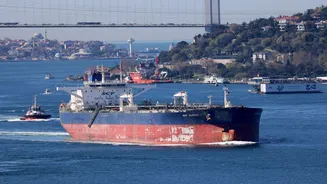Russia's oil export to India plunges
Russian oil export to India witnessed a sharp decline after the US sanctioned two of Moscow’s biggest oil companies, Rosneft and Lukoil, last month over the Russia-Ukraine war, provisional tanker data shows.
Although industry experts believe it is too early to gauge the impact and a clearer picture would emerge in a month or two, refiners have been wary of Washington’s latest sanctions, which will take effect on November 21.
In the week ending October 27, Russia’s crude oil exports to India averaged 1.19 million barrels per day (bpd), a sharp drop from 1.95 million bpd recorded over the previous two weeks, according to provisional vessel-tracking data from global commodity analytics firm Kpler.
The decline was largely driven by lower shipments from Rosneft and Lukoil, which together account for more than half of Russia’s oil output and exports, and previously supplied over two-thirds of India’s Russian oil imports.
China suspends oil purchases from Russia
Last month, Chinese state oil majors suspended purchases of seaborne Russian oil after the United States imposed sanctions on Rosneft and Lukoil.
Chinese national oil companies PetroChina Sinopec, CNOOC and Zhenhua Oil will refrain from dealing in seaborne Russian oil at least in the short-term due to concern over sanctions, the sources said.
The four companies did not immediately respond to requests for comment.
While China imports roughly 1.4 million barrels of Russian oil per day by sea, most of that is bought by independent refiners, including small operators known as teapots, although estimates of purchases by state refiners vary widely.
Is there an 'energy nexus' in the making?
Monique Taylor, an expert in global economy, wrote in East Asia Forum, "Discounted Russian crude has bound China more closely to Moscow and brought India into the equation, creating an emerging energy nexus that challenges US sanctions and influence. This ‘energy nexus’ is less an institutionalised partnership than a convergence of material interests and narratives of multipolarity linking Moscow, Beijing and New Delhi."
She added that this dynamic was evident at the Shanghai Cooperation Organisation summit held in Tianjin in September 2025, where Chinese President Xi Jinping, Russian President Vladimir Putin, and Indian Prime Minister Narendra Modi appeared together in a rare display of unity.
The event underscored Moscow’s growing reliance on its two biggest energy buyers and illustrated how the flow of discounted Russian oil has evolved into both an economic boon and a political statement, reflecting Beijing’s and New Delhi’s readiness to challenge Washington’s sanctions.
With inputs from agencies














